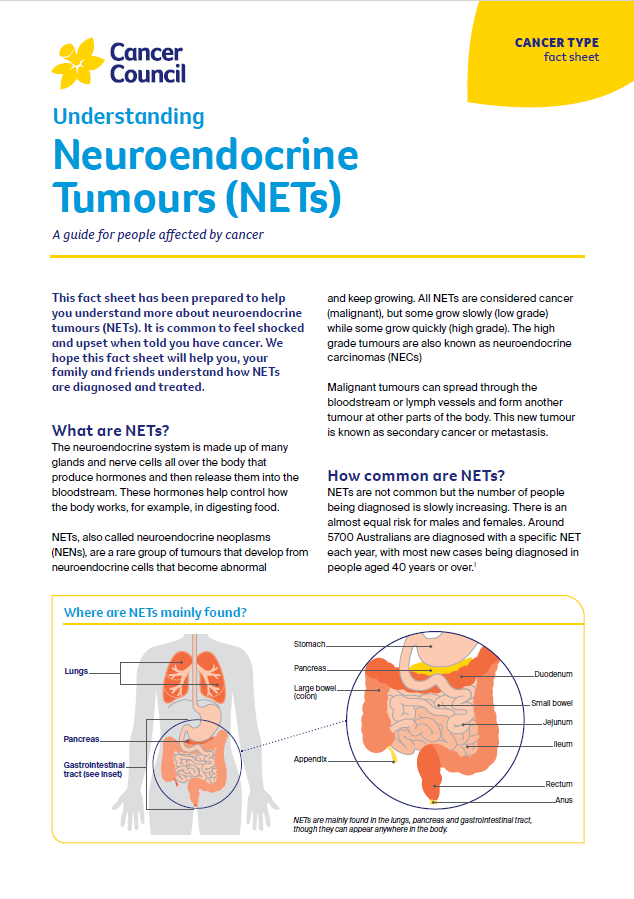- Home
- Neuroendocrine tumours (NETs)
- Diagnosis
Neuroendocrine tumours (NETs) diagnosis
NETs can be difficult to diagnose and are sometimes found when doctors are testing for a different condition.
Learn more about:
Tests and scans
If your doctor thinks that you may have a NET (or one of the syndromes associated with NETs), they will ask about your medical history, do a physical examination and run some tests.
If the results suggest that you may have a NET, your doctor will refer you to a specialist, who will usually carry out one or more of these tests:
| blood tests | A full blood count to measure your white blood cells, red blood cells and platelets and a hormone marker called chromogranin A. | ||
| urine tests | These measure the hormone serotonin (which can be produced by NETs). | ||
| endoscopy | A thin, flexible tube with a light and camera (endoscope) is inserted down the throat to examine the digestive tract. | ||
| gastroscopy | An examination of the large bowel with a camera on a flexible tube (colonoscope) which is passed through the anus. | ||
| bronchoscopy | A flexible tube with a light and camera is inserted down the throat to examine the airways and lungs and take tissue samples. | ||
| imaging scans | CT (computerised tomography), PET (positron emission tomography) and MRI (magnetic resonance imaging) scans use special machines to create pictures of the inside of your body while you lie still on an examination table. Before the scan, you may have an injection of dye (called contrast) or glucose into one of your veins, which makes the pictures clearer. The 2 different types of PET scans used for NETs are Gallium-68 Dotatate (also called Gatate scans) and fluorodeoxyglucose (FDG). The scan you have will depend on the type and grade of tumour. | ||
| biopsy | This removes a sample of tissue from the affected area for examination under a microscope. It is done either with a thin needle inserted into the tumour under local anaesthetic, or under general anaesthesia, known as an open biopsy. | ||
| echocardiogram | An ultrasound scan of the heart to check how it is working. | ||
Finding a NETs specialist
- NeuroEndocrine Cancer Australia can be contacted for a directory of specialists in NET care and treatment.
- Australasian Merkel Cell Carcinoma Interest Group (AMIGOs) can be contacted for a directory of specialists in Merkel cell carcinoma care and treatment.
Video: Getting diagnosed
Watch the video to learn what it is like getting diagnosed with neuroendocrine tumours (NETs).
Podcast: Tests and Cancer
Listen to more of our podcast for people affected by cancer
Dr David Chan, Medical Oncologist, Royal North Shore Hospital, NSW; Leslye Dunn, Consumer; Prof Gerald Fogarty, Radiation Oncologist, St Vincent’s Hospital, NSW; Katie Golden, Consumer; Dr Grace Kong, Nuclear Medicine Physician, Peter MacCallum Cancer Centre, VIC; Caitriona Nienaber, 13 11 20 Consultant, Cancer Council WA; Elizabeth Paton, Melanoma and Skin Cancer Trials Group, NSW.
View the Cancer Council NSW editorial policy.
